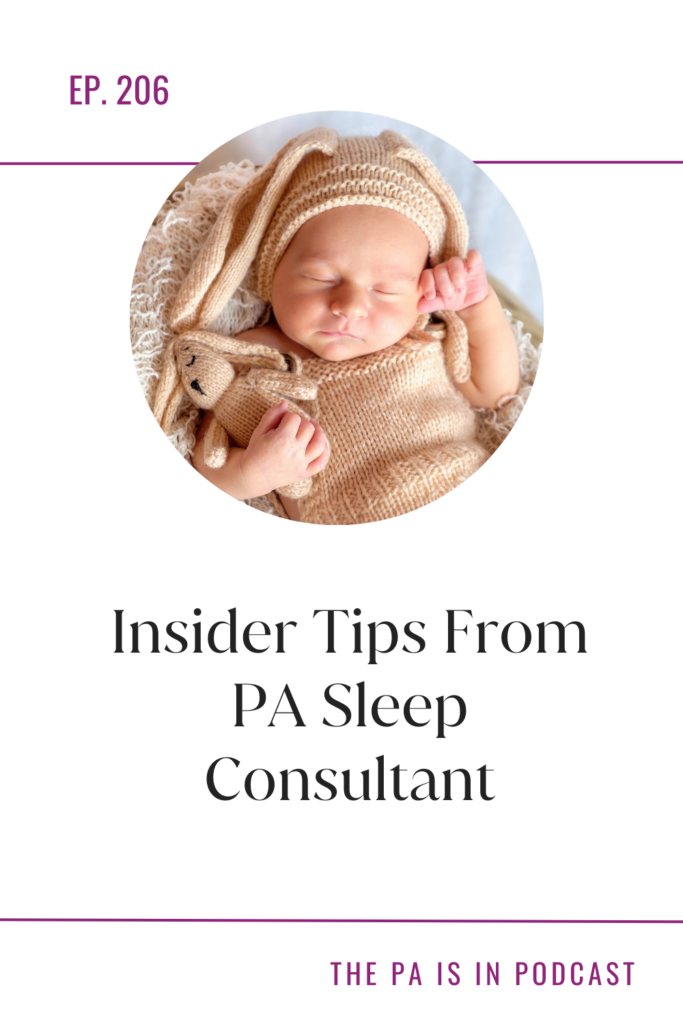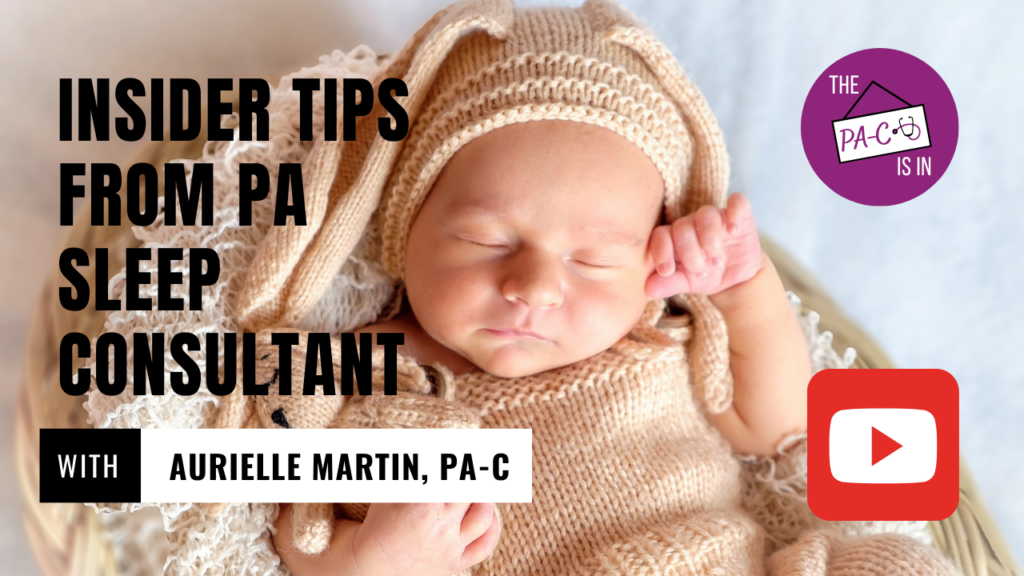
Meet Aurielle Martin, PA-C
Aurielle Martin has been a Family Medicine PA for 6 years and a pediatric sleep consultant for 1 ½ years. Her mission is to equip parents with the tools and skills necessary to empower their children to sleep independently. Aurielle believes independent sleep is a beautiful, powerful gift we can give to our children that they will carry into adulthood.
Aurielle became a sleep consultant when her now 2 ½ year old daughter was 6 months old and having difficulty sleeping. After searching for answers, Aurielle learned about sleep consultants from a friend who used one. Aurielle dove deeper to learn more about sleep consultants and how they use evidence-based medicine. She became certified as a sleep consultant herself and can now help her own clients and patients learn the tools needed for independent sleep.
Watch on YouTube

Where to Start When Teaching Proper Sleep Habits
Boundaries are important in the parenting realm, including sleep. Parents need to be consistent. We might think our children are manipulating us or acting out of control, but it’s important for us to remember that “children aren’t giving us a hard time; they’re having a hard time.” Children like structure and need strong expectations. Chaos happens when children feel like they don’t have control. We need to create a solid plan with expectations for our children and ourselves and then deliver on that plan consistently.
For example, your child may not stay in bed once they’re out of a crib. We need to set up the expectation that your child will stay in their bed, which is a safe sleep space. If your child comes to your room and says they’re scared of a monster, do you let them in your bed or do you search their room for a monster or use “monster spray?” What does your child learn in each of these scenarios? That it’s only safe in their parents’ room/bed? That there is something scary in their room? That monsters are real if you’re spraying “monster spray?” That they need protecting? Is your child more confused now? They are questioning whether are monsters real or not if sometime you say monsters aren’t real, but then other times you search their room for a monster or use “monster spray.” We need to change that messaging for children.
A different approach to this scenario starts with validating our child’s feelings. We need to tell them it’s ok to feel scared sometimes. Then we need to give them confidence that it’s safe in their room and safe to sleep. Confidence is contagious. Monsters and bad dreams are just stories. Take your child back to bed, tuck them in, kiss them good night, and then leave. In this scenario, your child knows they’re safe and also hears consistent messaging. This gives our child connection (with a hug and a kiss) as well as consistency.
Routine and Habits Around Bedtime
Set bedtime expectations during the day long before bedtime starts. Studies have shown that a consistent bedtime routine decreases bedtime awakenings and decreases time to fall asleep. This is statistically significant, but not clinically (the difference is only a few minutes). However, just as importantly, studies have shown that a consistent bedtime routine also improves mothers’ moods after 2 weeks. Moms feel less anger, fatigue, confusion, and tension. It is critically important that we also focus on moms’ (and dads’) mental health when discussing the importance of healthy sleep habits.
An example bedtime routine: Feeding. Bath. Lotion. PJs. Brush teeth. Read a book. Prayers (if this fits your family). Song. (Songs help take tension away and can be a pleasant surprise for a child if bedtime routine is new). Put your child in bed. Kiss goodnight. Say a short goodnight phrase, like “Sweet dreams. See you in the morning.” Turn on a white noise machine. Turn off the lights. Leave the room.
The important thing to remember is that the order of the bedtime routine always needs to be consistent. Also remember that toddlers take longer than infants. A toddler’s bedtime routine can be at least 30 minutes.
Bedtime Routines and Habits for Older Kids
Sleep hygiene is similar to adults in pre-teen and teen years. White noise cuts out distractions and extra noises. Phones/tablets/tvs should not be in the bedroom. Blackout curtains are useful for all ages. An important thing to remember is the bedroom should be for sleep only. It should not be a place for homework or playing as these are too stimulating for the brain. Bright colors in the bedroom can also be detrimental to sleep hygiene as they can be too stimulating. This can sometimes be difficult because older kids love to have their room decorated with fun, bright colors and designs. Parents should ask, “What color feels calm to you?” or “What color feels happy to you?” and then from there, the parent and kid can together decide appropriate colors and decorations for the kid’s bedroom.
The AAPA recommends less than 2 hours of screen time per day. There should be limited to no screen time after dinner time; however, this may not be realistic for a lot of families as after dinner may be the only time for screen time during the day. If that’s the case, families should do screens right after dinner and then give a break before bed.
Other bedtime habits include dimming lights during the evening to help the brain wind down before bedtime. Exercise during the day, not before bed because exercise releases endorphins and is too stimulating. Limit caffeine in general, but especially in evenings.
Parents need to encourage autonomy and critical thinking in our older kids. We can help them understand how certain habits can affect sleep. Ask our kids how exercise or caffeine or screens before bed affected their sleep or how they felt the next day. This empowers our kids to learn how to create positive sleep habits that they can use into adulthood.
Change Society’s Narrative
Society tells us, “You have kids – you’ll never sleep again.” We don’t need to believe this. We need to reframe and change the narrative. Instead, we can say, “Things are hard right now and you want the best in the world for your child. You can sleep better, and you will sleep better. You can set healthy boundaries and have positive, gentle parenting styles and be well-rested all at the same time as a parent.” When moms hear other moms with positive sleep stories, they learn there is another way. We can and should help other moms by sharing the importance of sleep hygiene and the effectiveness of sleep consultants.
What About Adult Sleep Habits?
When parents don’t sleep, they aren’t at their best. They can be more emotional, short-tempered and have decision fatigue. Therefore, it’s important that adults have positive, effective sleep hygiene as well as their kids.
Regarding the amount of sleep needed to feel rested and productive, it changes for each individual. One person may only need 6 hours or sleep, but another may need 9-10 hours each night. However, there are some recommendations that are beneficial to all adults, such as limiting caffeine, alcohol, and large meals before bed. Caffeine and alcohol in the evening interrupt sleep. When your body is digesting a large meal, it’s not ready for sleep. Eat a large meal early in the evening and only a small snack if needed right before bed. Just like for children blackout curtains and white noise machines are also good for sleep hygiene for adults. Limit screens before bed. Ideally, do not have a TV, tablet, or phone in your bedroom. Instead of your phone, use a normal alarm clock.
Another recommendation is to have a consistent bedtime each night. However, as PAs, this isn’t always possible. PAs can work 24 hour shifts or night shifts. Studies have shown that working shift work and interrupting our normal circadian rhythm results in poorer health outcomes. However, we still need to be flexible and do the best we can. If you are a PA working nights with interrupted sleep, try and have a consistent bedtime when you’re not working and definitely use blackout curtains.
An example of an adult bedtime routine: Preferably no TV or screens for at least 1 hour before bed. The blue light/screen light disrupts our normal circadian rhythm. Instead, read a book or listen to an audiobook or podcast. Have quiet conversations with your spouse. Do things that help you to feel like you’re winding down. Avoid alcohol. Do your skincare routine. Brush teeth. Shower if it helps you wind down and relax (don’t if you feel stimulated by showering). Get into bed. Can read some in bed. Turn off lights. Sleep.
Pediatric Sleep Solutions by Aurielle
Aurielle’s services focus on children, not adults. Although, Aurielle does recommend CBTI for adults – counselors certified in insomnia. Aurielle provides services for infants, toddlers, and children up to about 5 y/o, but she has also worked with older kids.
Aurielle will create a specific, individual sleep plan tailored for your specific child. She also ensures that the sleep plan is aligned with your specific family, parenting style and preferences.
She provides services for children who have a one-time “blip” in their sleep journey or have never slept well their entire lives. Her three main focuses are on getting the child to sleep independently at night, falling asleep, and falling back asleep if they wake up at night independently. The focus is on nighttime sleep first, and then nap routines follow.
Why is Sleep Hygiene Important?
Being able to sleep is something we need to do for the rest of our lives. It’s important to teach our children skills and tools to sleep well and to know what good sleep hygiene looks like. We need to teach our kids the importance of rest and recharging our brains and bodies.
Independent Sleep and Child Attachment
Sometimes parents wonder if sleep training will affect their child’s attachment. Should we respond to our kids immediately when they cry in their sleep? Should we let our kids cry it out? Will either option affect our child’s attachment to us?
It’s our job as parents to allow our children to feel strong emotions and guide them through them, not to stop the emotions from happening. We need to show consistency and love our children through those feelings. Longterm and shortterm studies show no difference between intervening or not intervening and affecting child attachment to parents.
There is no one answer. There is no one right way. Different things work for different families. We should encourage parents to do what feels right for their family and for each of their children.
Studies also show that the longer mothers are awake tending to infants 3-6 months postpartum, the lower the mothers’ perceived attachment. Maternal mental health is very overlooked. We need to support moms better. Moms shouldn’t feel less attached to their child because they’re not sleeping. We need to determine what the child needs AND determine what the parent needs so both can function well in the world. We show up better for our kids and are more patient, better versions of ourselves when we sleep well.
Aurielle has found her unicorn position in her sleep consultant work. Are you looking for your unicorn PA job? Check out episode 199 to learn how to custom design your dream unicorn job. Are you looking for someone to help you decide between two jobs or how to negotiate to create your unicorn job? Book a negotiation call with Tracy for specific concrete advice on your next steps. Are you looking for coaching support through a job transition, burnout or big life changes? Schedule a free 1-on-1 consult with Tracy to learn how she can help you understand your options and set up a coaching plan!